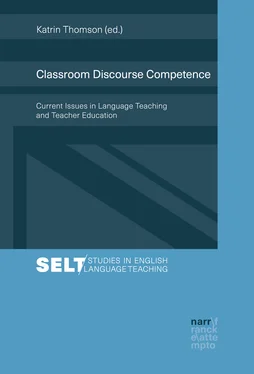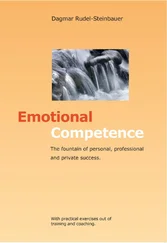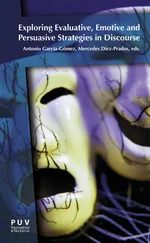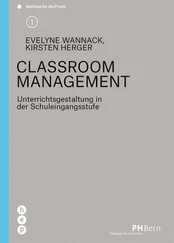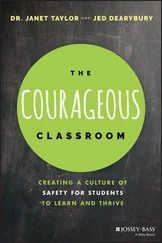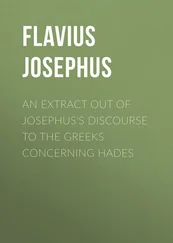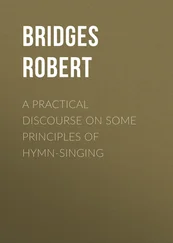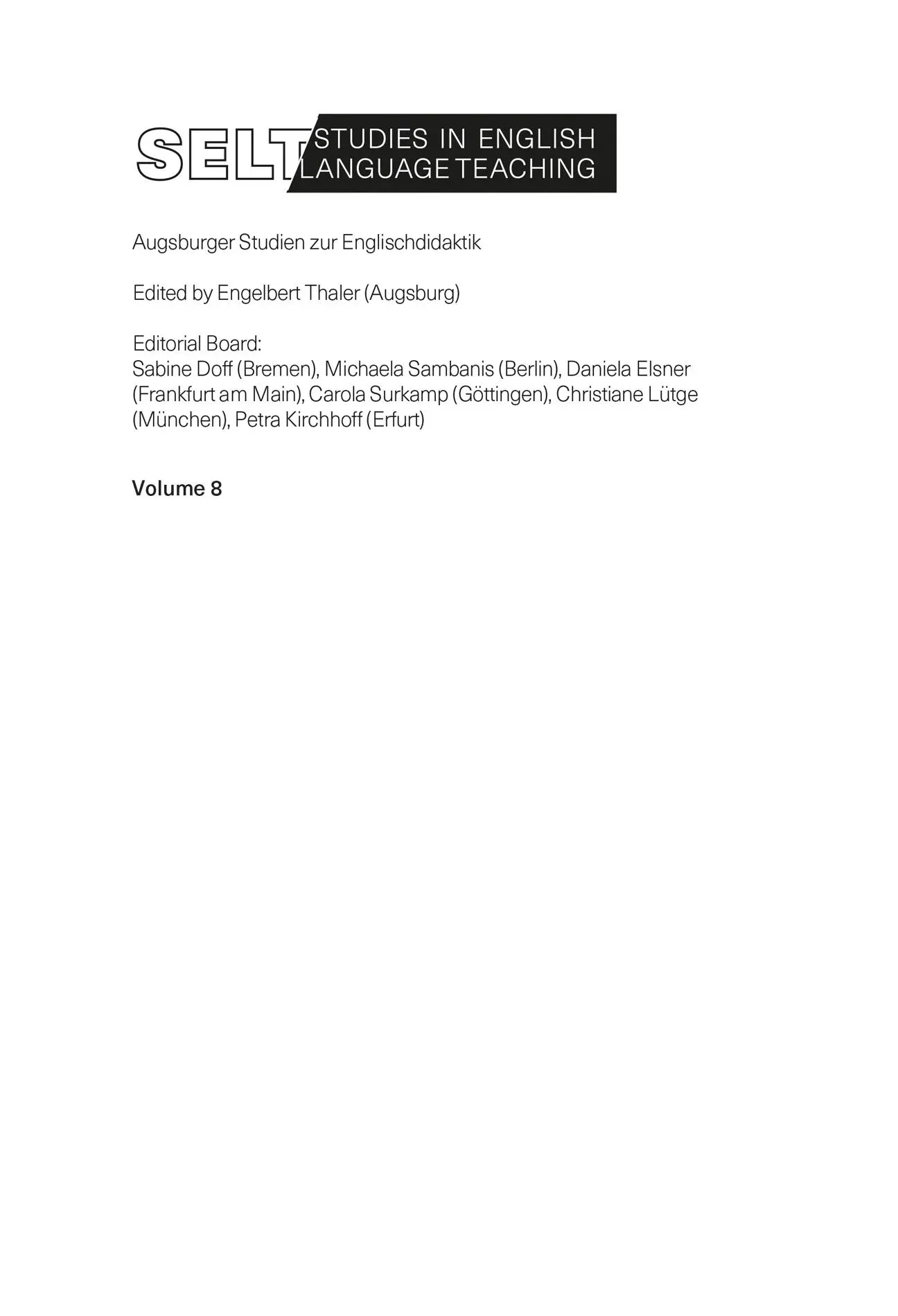
Katrin Thomson (ed.)
Classroom Discourse Competence
Current Issues in Language Teaching and Teacher Education
[bad img format]
DOI: https://doi.org/10.24053/9783823393740
© 2022 • Narr Francke Attempto Verlag GmbH + Co. KG
Dischingerweg 5 • D-72070 Tübingen
Das Werk einschließlich aller seiner Teile ist urheberrechtlich geschützt. Jede Verwertung außerhalb der engen Grenzen des Urheberrechtsgesetztes ist ohne Zustimmung des Verlages unzulässig und strafbar. Das gilt insbesondere für Vervielfältigungen, Übersetzungen, Mikroverfilmungen und die Einspeicherung und Verarbeitung in elektronischen Systemen.
Alle Informationen in diesem Buch wurden mit großer Sorgfalt erstellt. Fehler können dennoch nicht völlig ausgeschlossen werden. Weder Verlag noch Autor:innen oder Herausgeber:innen übernehmen deshalb eine Gewährleistung für die Korrektheit des Inhaltes und haften nicht für fehlerhafte Angaben und deren Folgen. Diese Publikation enthält gegebenenfalls Links zu externen Inhalten Dritter, auf die weder Verlag noch Autor:innen oder Herausgeber:innen Einfluss haben. Für die Inhalte der verlinkten Seiten sind stets die jeweiligen Anbieter oder Betreibenden der Seiten verantwortlich.
Internet: www.narr.deeMail: info@narr.de
ISSN 2367-3826
ISBN 978-3-8233-8374-1 (Print)
ISBN 978-3-8233-0375-6 (ePub)
Part I – Introduction: Classroom Discourse and Classroom Discourse Competence
Introduction
Classroom Discourse Competence (CDC) in Foreign Language Teaching and Language Teacher Education
Katrin Thomson
1 Introduction: Volume Rationale
This volume moves (E)FL teachers’ classroom discourse competence (CDC) center stage and emphasizes CDC’s vital importance to effective foreign language teaching and, consequently, to successful L2 student learning. Classroom discourse, classroom interaction and classroom communication have been in the focus of researchers for many decades (cf. Walsh 2011: 1), with much of the work having come from (Applied) Linguistics. One of the main objectives of this volume is to further the scholarly discussion on classroom discourse and foreign language teacher education, which entails a marked shift of focus from learner to teacher competences. That is to say that in contrast to existing concepts (such as Galaczi/Taylor’s (2018) interactional competence, Johnson’s (1995) classroom communicative competence or Walsh’s (e.g. 2011, 2012, 2013, 2014) classroom interactional competence), classroom discourse competence clearly and solely denotes a competence of foreign language teachers – not learners.
Broadly speaking, language teachers, who have developed CDC, are able to structure and organize classroom discourse through professional use of the L2 (and other languages) in FL teaching and learning contexts. Language teachers’ (verbal) actions and classroom discourse tasks (including those in classroom management), then, are carried out purposefully and in ways that promote student learning. Moreover, teachers’ discoursal practices manifest themselves in classroom context-adapted decision-making, which – among other factors – is based on profound professional knowledge, pedagogic reflections and classroom discourse awareness. This (here only roughly mapped out) understanding of CDC1 rests on the premise that the quality of teacher talk in foreign language classroom discourse is of paramount importance for learners’ FL competence and achievement gains (Thomson 2020a). Teachers’ CDC, thus, goes far beyond the mere notion of L2 proficiency, communicative or interactional competence, as it always entails a pedagogical, professional dimension (cf. Widdowson 2002, Hallet 2006). It is apparent that a core competence like CDC requires theoretical conceptualization as well as systematic development in initial language teacher education. This volume seeks to tackle these issues, but by no means intends to be exhaustive.
Any volume that conceptualizes classroom discourse competence as a professional competence of language teachers is, of course, informed by the large body of international scholarly literature and research on foreign language teaching and learning, second language acquisition, classroom discourse, conversation analysis, language teacher education and other related areas. Tapping into these international perspectives as well, this volume however primarily focuses on the context-specific situation in Germany. Within this national context, language teachers’ professional competences in general have increasingly come into the focus of policy makers, researchers and teacher educators in recent years. This, however, does not necessarily hold true to the same extent for teachers’ professional L2 classroom discourse competences which, so far, have only played a marginal role in pre-service foreign language teacher education – and beyond (cf. García 2017).
2 On the Neglected Role of CDC in Language Teacher Education
Teacher education at university level, which is the initial phase of teacher professionalization in Germany, primarily focuses on teacher candidates’ acquisition of specialist knowledge and competences in the school subjects they are going to teach later on. With regard to teaching degree programs in modern foreign languages such as English, French, Italian or Spanish, it is especially within the domains of linguistics, literary, cultural and media studies as well as within the field of general pedagogy and education that professional content knowledge ( Fachwissen ) and pedagogical knowledge ( pädagogisches Wissen ), respectively, is acquired. Furthermore, in tailor-made specialist courses on foreign language teaching (e.g. TEFL courses), prospective teachers are expected to gain pedagogical content knowledge ( fachdidaktisches Wissen ) and develop expertise in various areas of language teaching such as lesson planning, practical implementations of CLT principles (like, for instance, student-activation, task-orientation or differentiation), course book analysis, methodological approaches to teaching literature, culture, grammar, vocabulary etc., to name but a few. While teacher education programs at universities prioritize TEFL students’ acquisition of professional knowledge in the domains mentioned above, a core component of language teacher professionalism has been (and mostly still is) largely neglected: classroom discourse competence (CDC). There are several reasons for this:
The past ten or fifteen years of research on foreign language teacher education in Germany have seen a remarkable increase in theoretical and empirical research activities with a strong focus on foreign language teachers’ professional knowledge . Researchers have been particularly interested in gaining deeper insights into the different types of knowledge (see above) that inform, determine or shape EFL teachers’ classroom actions and decision-making (e.g. Roters et al. 2011, Roters et al. 2013, Kirchhoff 2016). Roters et al. (2013), for instance, first specified the construct components of EFL teachers’ pedagogical content knowledge and, subsequently, operationalized this construct for the purpose of testing and evaluating (prospective) teachers’ knowledge in this particular domain. While researching and testing teachers’ professional knowledge is a challenging task in itself, theoretical modelling as well as the practical implementation and systematic assessment of teacher competences (such as CDC) presents even greater challenges to researchers and educators – considering the complexity of the construct ‘competence’ (e.g. Blömeke et al. 2015). Hence, for CDC to gain a more prominent role in EFL teacher education at university, a theoretical model is required which not only provides a structural framework for practical implementation at university level but also allows for operationalization in empirical research. With regard to foreign language teacher education in Germany, such a conceptual model or framework does however not yet exist.
Читать дальше
